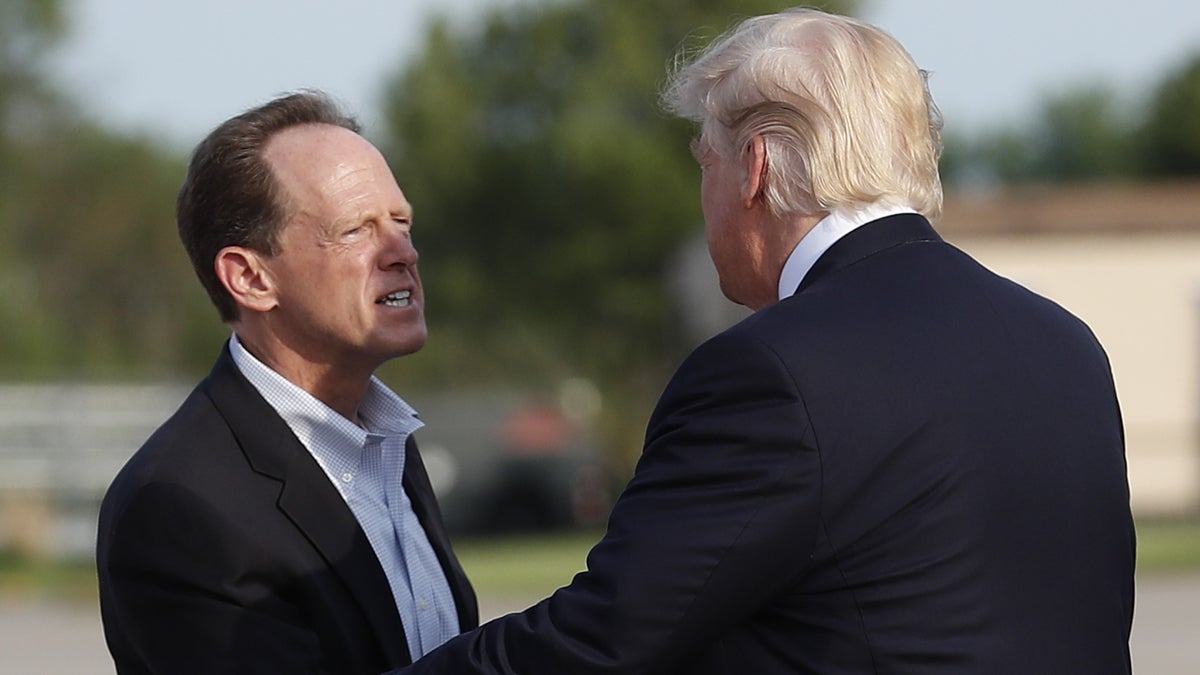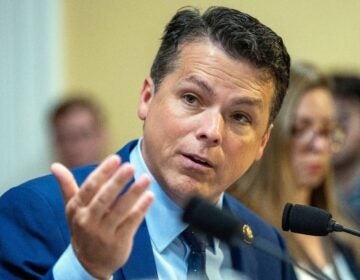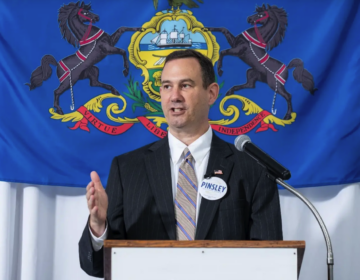Toomey’s health care tax cut costs Pennsylvania up to $4.8 billion per year

Sen. Pat Toomey, R-Pa., is shown greeting President Donald Trump at Harrisburg International Airport in Middletown, Pa., in April. (AP Photo/Carolyn Kaster)
The health care bill in the U.S. Senate is very much like the one in the House, but in one respect it is far worse, thanks to Pennsylvania Sen. Pat Toomey.
Too few people know that the the American Health Care Act not only repeals the Affordable Care Act, but it drastically cuts traditional Medicaid, taking us not just to 2010, but all the way back to 1965.
Of the roughly 1.2 million people in the commonwealth who would lose health coverage, 701,345 do so because of changes to Medicaid. Some of the Medicaid coverage losses come from effectively ending the Medicaid expansion. But other health insurance losses come from making deep cuts to Pennsylvania’s traditional Medicaid program, including 125,100 children, 52,600 people with disabilities, and 48,000 seniors.
The House bill would cut $18.9 billion in federal support for the state’s traditional and expanded Medicaid program over six years — an average of $3.41 billion a year. And, far from being more moderate, the Senate bill is worse.
Provisions in the Senate bill would penalize states that have higher-than-average costs, even if those cost are due to an older population, as they are in Pennsylvania. Deeper cuts would be put in place in the next 10 years.
These changes might lead to another $1 billion to $2 billion annual reductions in federal support. Tens of thousands more Pennsylvanians might lose insurance. Or, alternatively, all Medicaid recipients would see their benefits and choice of health care providers radically limited.
And why are these cuts necessary? Because for Toomey and other Republicans, this legislation is not about improving health care — it does not do that in any respect. It is about cutting taxes $600 billion for the richest Americans and some of the largest American corporations.
Currently, the federal government pays a fixed share — about 50 percent in Pennsylvania — of medical and long-term care costs under Medicaid. The Republican plans change Medicaid’s financing to a per-capita cap program in which the federal government’s reimbursement is limited to a fixed amount for each person enrolled. That per-capita cap starts with what each state spent in 2016, then increases the cap by an inflation index every year.
This plan undermines financing of Medicaid in Pennsylvania in two ways:
First, the index for increasing the caps in the Senate bill is set below the rate of expected Medicaid growth in Pennsylvania, which is 3.9 percent. Thanks to Toomey, it is reduced to an expected 2.4 percent after 2025. As medical care costs increase faster than the index, federal reimbursements will fall increasingly short.
This first problem is not a result of what Toomey calls “out of control” Medicaid spending. Medicaid is our most efficient health care program. And Pennsylvania has been one of the states taking the lead in using managed care providers to constrain the growth of Medicaid spending. Between 2012 and 2014, Pennsylvania’s annual growth rate in Medicaid of 3.9 percent was below the national Medicaid average of 4.4 percent, as well as below the private insurance average of 5.3 percent.
The second problem is that per-capita caps would not give states the funds to cover unexpected health care expenses. States would not have federal funds to respond to epidemics like Zika, or public health crises like the opioid epidemic, or natural disasters. Nor would states be able to secure funds for new, expensive life-saving treatments.
Given the steep cuts to federal funding for Medicaid under both bills, Pennsylvania will have to make the difficult choice between raising new revenues to replace federal funding or making devastating cuts to Medicaid eligibility and benefits. A General Assembly unwilling to raise new revenue to close our existing structural deficit, which will grow to $3 billion a year by 2019, is unlikely to make the former choice.
Thus, if the the Republican health care plan passes, Pennsylvania might adopt extreme policies such as creating waiting lists or time limits on health care benefits. Low reimbursement rates to medical providers doctors and hospitals might be reduced more, leading them to drop out of the program. Services that help many people live more independent lives, as well as other optional programs, may be eliminated. These include home and community-based services that keep people – including seniors – out of institutions, support that helps individuals with complex health needs, certain therapies for children with disabilities, school-based health services, oral health benefits, and transportation that helps home-bound individuals get to the doctor. These benefit reductions will leave people sicker and less independent.
Thanks to Sen. Toomey’s determination to reward the rich, thousands of Pennsylvanians will die prematurely and tens of thousands will suffer from illness.
—
Marc Stier is the director of the Pennsylvania Budget and Policy Center.
WHYY is your source for fact-based, in-depth journalism and information. As a nonprofit organization, we rely on financial support from readers like you. Please give today.




